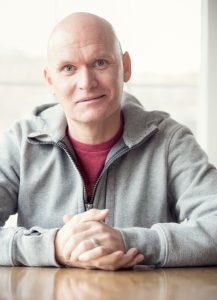
Author Anthony Doerr was on a train to New York City to meet with his book publisher in 2004, when the man riding in front of him lost his mind over a dropped cellphone call as they passed through a tunnel approaching Manhattan.
“I began asking myself, ‘How did we all get to the point where we take for granted that this technology will work?’” he explained years later to an Ohio Magazine writer. “I decided I wanted to tell a story set in a time when the magic of this kind of long-distance communication was not taken for granted—when hearing the voice of a stranger or loved one in your ear was magical….When I learned how Hitler and the entire Nazi party used it as a tool for propaganda, I knew I would set the novel in World War II.”
That novel, All the Light We Cannot See: A Novel (Scribner, 2014)—which took Doerr a decade to research and write—was awarded the 2015 Pulitzer Prize for fiction and the 2015 Andrew Carnegie Medal for Excellence in Fiction.
The instant New York Times bestseller, which chronicles the parallel and eventually intersecting lives of two European children in World War II, has been chosen as Case Western Reserve University’s 2016 common reading selection for first-year undergraduates.
The awarding Pulitzer committee described the work as “an imaginative and intricate novel inspired by the horrors of World War II and written in short, elegant chapters that explore human nature and the contradictory power of technology.”
And from The New Yorker: “A meditation on fate, free will and the way that, in wartime, small choices can have vast consequences.”
The novel made more than a dozen year-end lists, including Barnes & Noble, Slate.com, NPR’s Fresh Air, Entertainment Weekly, The Guardian, Kirkus, The New York Times, The Washington Post and The Christian Science Monitor.
“Not only is it a beautifully written and engaging story,” said Timothy Beal, the Florence Harkness Professor of Religion, chair of the Department of Religious Studies and also of the common reading program. “It is also carefully researched, both in terms of social-historical context and in its engagement with radio technology and related sciences. We hope the book will appeal to students with a wide range of academic and personal interests and passions.”
Each year since 2002, the university’s common reading book serves as a basis for programs and discussions for first-year students from orientation through fall semester. Incoming students receive the book to read during the summer.
Doerr, who grew up in Novelty, Ohio, and graduated from University School in 1991, will discuss the book as the Elaine G. Hadden Distinguished Visiting Author/Common Reading Convocation Speaker during fall convocation—the official opening of the 2016-17 academic year—on Wednesday, Aug. 31, at 4:30 p.m. in Severance Hall. The event is open to the public, but reservations are recommended. Ticketing information will be made available this summer.
Unlikely paths cross
 All the Light We Cannot See treats readers to the story of a blind French girl and German boy whose paths collide in occupied France as both try to survive the devastation of World War II.
All the Light We Cannot See treats readers to the story of a blind French girl and German boy whose paths collide in occupied France as both try to survive the devastation of World War II.
Marie-Laure, who lives with her father in Paris, goes blind at age 6. Her father builds a miniature replica of their neighborhood so she can memorize it by touch and navigate her way home. At 12, the Nazis occupy Paris, and father and daughter flee to the walled citadel of Saint-Malo, where Marie-Laure’s reclusive great-uncle lives.
Meanwhile, orphan Werner Pfennig grows up in a German mining town with his younger sister, enchanted by a crude radio they find. He becomes an expert at building and fixing these new instruments—a talent that earns him a place at a brutal academy for Hitler Youth, then a special assignment to track the resistance.
Growing more aware of the human cost of his intelligence, the lives of Werner and Marie-Laure converge in Saint-Malo, where the novelist illuminates the ways, against all odds, people try to be good to one another.
About the author
Doerr, who lives in Boise, Idaho, with his wife and their twin sons, earned a bachelor’s degree in history from Bowdoin College and a master of fine arts degree from Bowling Green State University.
He has won numerous prizes, both in the United States and abroad, including four O. Henry Prizes, three Pushcart Prizes, the Rome Prize, the New York Public Library’s Young Lions Award, the National Magazine Award for fiction, a Guggenheim Fellowship and the Story Prize.
Asked to explain what the book’s title meant to him, Doerr told Ohio Magazine it was a metaphor “for [the fact] that the slice of possibility we see is so small, and there is so much culturally, scientifically and politically out there that we cannot see.
“The title also allowed me to explore blindness, allowed me to [develop] the character of Werner, who in many ways is more blind than Marie-Laure because he can’t or chooses not to see [what is happening in his world],” Doerr said. “And it helped me play with a lot of different ideas about the things we should see but do not.”
